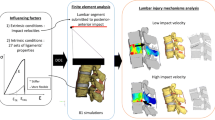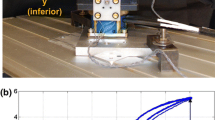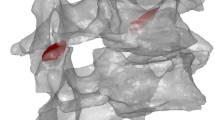Abstract
Cervical disc injury due to frontal impact has been observed in both clinical and biomechanical investigations; however, there is a lack of data that elucidate the mechanisms of disc injury during these collisions. The goals of the current study were to determine the peak dynamic disc annular tissue strain and disc shear strain during simulated frontal impact of the whole human cervical spine model with muscle force replication at 4 g, 6 g, 8 g and 10 g horizontal accelerations of the T1 vertebra. These data were compared with those obtained during physiological loading, and with previously reported rear impact data. Peak disc shear strain and peak annular tissue strain during frontal impact exceeded (p<0.05) corresponding physiological limits at the C2–C3 intervertebral level, beginning at 4 g and 6 g, respectively. These subsequently spread throughout the entire cervical spine at 10 g, with the exception of C4–C5. The C5–C6 intervertebral level was at high risk for injury during both frontal and rear impacts, while during frontal impact, in addition to C5–C6, subfailure injuries were likely at superior intervertebral levels, including C2–C3. The disc injuries occurred at lower impact accelerations during rear impact as compared with frontal impact. The subfailure injuries of the cervical intervertebral disc that occur during frontal impact may lead to the chronic symptoms reported by patients, such as head and neck pain.






Similar content being viewed by others
References
Allen BL Jr, Ferguson RL, Lehmann TR, O’Brien RP (1982) A mechanistic classification of closed, indirect fractures and dislocations of the lower cervical spine. Spine 7:1–27
Barnsley L, Lord S, Bogduk N (1994) Whiplash injury. Pain 58:283–307
Bogduk N, Marsland A (1986) On the concept of third occipital headache. J Neurol Neurosurg Psychiatry 49:775–80
Bogduk N, Windsor M, Inglis A (1988) The innervation of the cervical intervertebral discs. Spine 13:2–8
Bostrom O, Bohman K, Haland Y, Kullgren A (2000) New AIS1 long-term neck injury criteria candidates based on real frontal crash analysis. International Research Council on the Biomechanics of Impact. Montpelier, France, 249–280
Braakman R, Penning L (1971) Injuries of the cervical spine. Excelptra Media, Netherlands
Burke JG, Watson RW, McCormack D et al (2002) Intervertebral discs which cause low back pain secrete high levels of proinflammatory mediators. J Bone Joint Surg Br 84:196–201
Butler D, Trafimow JH, Andersson GB, McNeill TW, Huckman MS (1990) Discs degenerate before facets. Spine 15:111–113
Clemens HJ, Burow K (1972) Experimental investigation on injury mechanisms of cervical spine at frontal and rear-front vehicle impacts. Society of Automotive Engineers, paper No. 720960
Coppes MH, Marani E, Thomeer RT, Groen GJ (1997) Innervation of “painful” lumbar discs. Spine 22:2342–2349
Crowell RR, Shea M, Edwards WT et al (1993) Cervical injuries under flexion and compression loading. J Spinal Disord 6:175–181
Davis SJ, Teresi LM, Bradley WG Jr, Ziemba MA, Bloze AE (1991) Cervical spine hyperextension injuries: MR findings. Radiology 180:245–251
deJager M, Sauren A, Thunnissen J, Wismans J (1994) A three-dimensional head-neck model: validation for frontal and lateral Impacts. Society of Automotive Engineers, paper No. 942211
Drottning M (2003) Cervicogenic headache after whiplash injury. Curr Pain Headache Rep 7:384–386
Drottning M, Staff PH, Sjaastad O (2002) Cervicogenic headache (CEH) after whiplash injury. Cephalalgia 22:165–171
Dvorak J, Panjabi MM, Novotny JE, Antinnes JA (1991) In vivo flexion/extension of the normal cervical spine. J Orthop Res 9:828–834
Ewing CL, Thomas DJ, Beeler GW, Patrick LM, Gillis DB (1968) Dynamic response of the head and neck of the living human to -Gx impact acceleration. Society of Automotive Engineers, paper No. 680792
Ewing CL, Thomas DJ, Patrick LM, Beeler GW, Smith MJ (1969) Living human dynamic response to -Gx impact acceleration: Part II accelerations measured on the head and neck. Society of Automotive Engineers, paper No. 690817
Ewing CL, Thomas DJ, Lustick L et al (1975) The effect of the initial position of the head and neck on the dynamic response of the human head and neck to -gx impact acceleration. Society of Automotive Engineers, paper No. 751157
Ewing CL, Thomas DJ, Lustick L et al (1976) The effect of duration, rate of onset and peak sled acceleration on the dynamic response of the human head and neck. Society of Automotive Engineers, paper No. 760800
Ghole SA, Ivancic PC, Tominaga Y, Gimenez SE, Panjabi MM (2004) Incremental and single trauma produce equivalent subfailure soft tissue injury of the cervical spine. Clin Biomech (Bristol, Avon) 19:784–789
Herkowitz HN, Rothman RH (1984) Subacute instability of the cervical spine. Spine 9:348–357
Hohl M (1974) Soft-tissue injuries of the neck in automobile accidents. Factors influencing prognosis. J Bone Joint Surg Am 56:1675–1682
Hohl M (1975) Soft tissue injuries of the neck. Clin Orthop:42–49
Hsieh AH, Lotz JC (2003) Prolonged spinal loading induces matrix metalloproteinase-2 activation in intervertebral discs. Spine 28:1781–1788
Ito S, Ivancic PC, Panjabi MM, Cunningham BW (2004) Soft tissue injury threshold during simulated whiplash: a biomechanical investigation. Spine 29:979–987
Ivancic PC, Pearson AM, Panjabi MM, Ito S (2004) Injury of the anterior longitudinal ligament during whiplash simulation. Eur Spine J 13:61–68
Jonsson H, Bring G, Rauschning W, Sahlstedt B (1991) Hidden cervical spine injuries in traffic accident victims with skull fractures. J Spinal Disord 4:251–263
Jonsson H, Cesarini K, Sahlstedt B, Rauschning W (1994) Findings and outcome in whiplash-type neck distortions. Spine 19:2733–2743
Jull G, Bogduk N, Marsland A (1988) The accuracy of manual diagnosis for cervical zygapophysial joint pain syndromes. Med J Aust 148:233–236
Kallieris D, Mattern R, Miltner E, Schmidt MH, Stein K (1991) Considerations for a neck injury criterion. Society of Automotive Engineers, paper No. 912916
Kaneoka K, Ono K, Inami S, Hayashi K (1999) Motion analysis of cervical vertebrae during whiplash loading. Spine 24:763–769
Kang JD, Stefanovic-Racic M, McIntyre LA, Georgescu HI, Evans CH (1997) Toward a biochemical understanding of human intervertebral disc degeneration and herniation. Contributions of nitric oxide, interleukins, prostaglandin E2, and matrix metalloproteinases. Spine 22:1065–1073
Krafft M, Kullgren A, Lie A, Nygren A, Tingvall C (1997) Soft tissue injury of the cervical spine in rear-end car collisions. J Traff Med 25 Nos. 3–4:89–96
Kullgren A, Krafft M, Nygren A, Tingvall C (2000) Neck injuries in frontal impacts: influence of crash pulse characteristics on injury risk. Accid Anal Prev 32:197–205
Kumar S, Narayan Y, Amell T (2003) Analysis of low velocity frontal impacts. Clin Biomech (Bristol, Avon) 18:694–703
Leonardi M, Simonetti L, Agati R (2002) Neuroradiology of spine degenerative diseases. Best Pract Res Clin Rheumatol 16:59–87
Mercer S, Bogduk N (1999) The ligaments and annulus fibrosus of human adult cervical intervertebral discs. Spine 24:619–626
Mertz HJ, Patrick LM (1967) Investigation of the kinematics and kinetics of whiplash. Society of Automotive Engineers, paper No. 670918
Mertz HJ, Patrick LM (1971) Strength and response of the human neck. Society of Automotive Engineers, paper No. 710855
Ordway NR, Seymour RJ, Donelson RG, Hojnowski LS, Edwards WT (1999) Cervical flexion, extension, protrusion, and retraction. A radiographic segmental analysis. Spine 24:240–247
Osti OL, Vernon-Roberts B, Fraser RD (1990) 1990 Volvo Award in experimental studies. Anulus tears and intervertebral disc degeneration. An experimental study using an animal model. Spine 15:762–767
Osti OL, Vernon-Roberts B, Moore R, Fraser RD (1992) Annular tears and disc degeneration in the lumbar spine. A post-mortem study of 135 discs. J Bone Joint Surg Br 74:678–682
Panjabi MM, Oxland TR, Lin RM, McGowen TW (1994) Thoracolumbar burst fracture. A biomechanical investigation of its multidirectional flexibility. Spine 19:578–585
Panjabi MM, Cholewicki J, Nibu K, Babat LB, Dvorak J (1998) Simulation of whiplash trauma using whole cervical spine specimens. Spine 23:17–24
Panjabi MM, Cholewicki J, Nibu K, Grauer J, Vahldiek M (1998) Capsular ligament stretches during in vitro whiplash simulations. J Spinal Disord 11:227–232
Panjabi MM, Cholewicki J, Nibu K et al (1998) Mechanism of whiplash injury. Clin Biomech (Bristol, Avon) 13:239–249
Panjabi MM, Nibu K, Cholewicki J (1998) Whiplash injuries and the potential for mechanical instability. Eur Spine J 7:484–492
Panjabi MM, Crisco JJ, Vasavada A et al (2001) Mechanical properties of the human cervical spine as shown by three-dimensional load-displacement curves. Spine 26:2692–2700
Panjabi MM, Ito S, Pearson AM, Ivancic PC (2004) Injury mechanisms of the cervical intervertebral disc during simulated whiplash. Spine 29:1217–1225
Pearson AM, Ivancic PC, Ito S, Panjabi MM (2004) Facet joint kinematics and injury mechanisms during simulated whiplash. Spine 29:390–397
Pettersson K, Hildingsson C, Toolanen G, Fagerlund M, Bjornebrink J (1997) Disc pathology after whiplash injury. A prospective magnetic resonance imaging and clinical investigation. Spine 22:283–287
Radanov BP, Sturzenegger M, Di Stefano G (1995) Long-term outcome after whiplash injury. A 2-year follow-up considering features of injury mechanism and somatic, radiologic, and psychosocial findings. Medicine 74:281–297
Richter M, Otte D, Pohlemann T, Krettek C, Blauth M (2000) Whiplash-type neck distortion in restrained car drivers: frequency, causes and long-term results. Eur Spine J 9:109–117
Spitzer WO, Skovron ML, Salmi LR et al (1995) Scientific monograph of the Quebec Task Force on Whiplash-Associated Disorders: redefining “whiplash” and its management. Spine 20:1S-73S
Taylor JR, Twomey LT (1993) Acute injuries to cervical joints. An autopsy study of neck sprain. Spine 18:1115–1122
Thunnissen J, Wismans J, Ewing CL, Thomas DJ (1995) Human volunteer head-neck response in frontal flexion: a new analysis. Society of Automotive Engineers, paper No. 952721
Walz FH, Muser MH (1995) Biomechanical aspects of cervical spine injuries. Society of Automotive Engineers, paper No. 950658
Wismans J, Spenny CH (1984) Head-neck response in frontal flexion. Society of Automotive Engineers, paper No. 841666
Wismans J, van Oorschot H, Woltring HJ (1986) Omni-directional human head-neck response. Society of Automotive Engineers, paper No 861893
Wismans J, Philippens M, van Oorschot E (1987) Comparison of human volunteer and cadaver head-neck response in frontal flexion. Society of Automotive Engineers, paper No. 872194
Yoganandan N, Pintar F, Butler J et al (1989) Dynamic response of human cervical spine ligaments. Spine 14:1102–1110
Acknowledgements
This research was supported by NIH Grant 1 R01 AR45452 1A2 and the Doris Duke Charitable Foundation
Author information
Authors and Affiliations
Corresponding author
Rights and permissions
About this article
Cite this article
Ito, S., Ivancic, P.C., Pearson, A.M. et al. Cervical intervertebral disc injury during simulated frontal impact. Eur Spine J 14, 356–365 (2005). https://doi.org/10.1007/s00586-004-0783-4
Received:
Revised:
Accepted:
Published:
Issue Date:
DOI: https://doi.org/10.1007/s00586-004-0783-4




